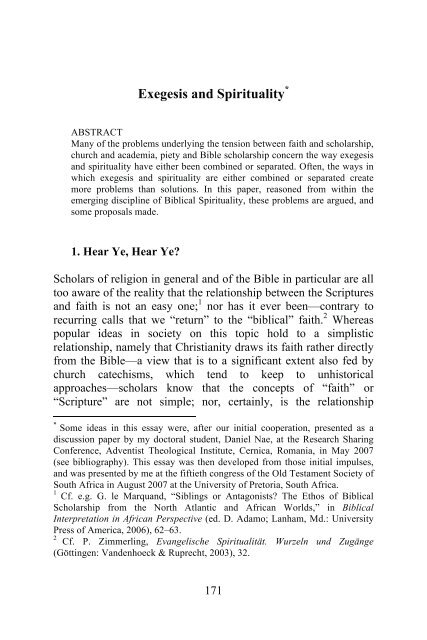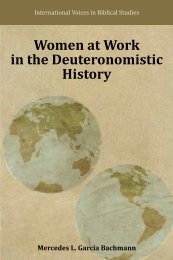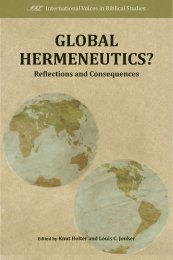The Old Testament and Christian Spirituality - International Voices in ...
The Old Testament and Christian Spirituality - International Voices in ...
The Old Testament and Christian Spirituality - International Voices in ...
You also want an ePaper? Increase the reach of your titles
YUMPU automatically turns print PDFs into web optimized ePapers that Google loves.
Exegesis <strong>and</strong> <strong>Spirituality</strong> *<br />
ABSTRACT<br />
Many of the problems underly<strong>in</strong>g the tension between faith <strong>and</strong> scholarship,<br />
church <strong>and</strong> academia, piety <strong>and</strong> Bible scholarship concern the way exegesis<br />
<strong>and</strong> spirituality have either been comb<strong>in</strong>ed or separated. Often, the ways <strong>in</strong><br />
which exegesis <strong>and</strong> spirituality are either comb<strong>in</strong>ed or separated create<br />
more problems than solutions. In this paper, reasoned from with<strong>in</strong> the<br />
emerg<strong>in</strong>g discipl<strong>in</strong>e of Biblical <strong>Spirituality</strong>, these problems are argued, <strong>and</strong><br />
some proposals made.<br />
1. Hear Ye, Hear Ye?<br />
Scholars of religion <strong>in</strong> general <strong>and</strong> of the Bible <strong>in</strong> particular are all<br />
too aware of the reality that the relationship between the Scriptures<br />
<strong>and</strong> faith is not an easy one; 1 nor has it ever been—contrary to<br />
recurr<strong>in</strong>g calls that we “return” to the “biblical” faith. 2 Whereas<br />
popular ideas <strong>in</strong> society on this topic hold to a simplistic<br />
relationship, namely that <strong>Christian</strong>ity draws its faith rather directly<br />
from the Bible—a view that is to a significant extent also fed by<br />
church catechisms, which tend to keep to unhistorical<br />
approaches—scholars know that the concepts of “faith” or<br />
“Scripture” are not simple; nor, certa<strong>in</strong>ly, is the relationship<br />
*<br />
Some ideas <strong>in</strong> this essay were, after our <strong>in</strong>itial cooperation, presented as a<br />
discussion paper by my doctoral student, Daniel Nae, at the Research Shar<strong>in</strong>g<br />
Conference, Adventist <strong>The</strong>ological Institute, Cernica, Romania, <strong>in</strong> May 2007<br />
(see bibliography). This essay was then developed from those <strong>in</strong>itial impulses,<br />
<strong>and</strong> was presented by me at the fiftieth congress of the <strong>Old</strong> <strong>Testament</strong> Society of<br />
South Africa <strong>in</strong> August 2007 at the University of Pretoria, South Africa.<br />
1<br />
Cf. e.g. G. le Marqu<strong>and</strong>, “Sibl<strong>in</strong>gs or Antagonists? <strong>The</strong> Ethos of Biblical<br />
Scholarship from the North Atlantic <strong>and</strong> African Worlds,” <strong>in</strong> Biblical<br />
Interpretation <strong>in</strong> African Perspective (ed. D. Adamo; Lanham, Md.: University<br />
Press of America, 2006), 62–63.<br />
2<br />
Cf. P. Zimmerl<strong>in</strong>g, Evangelische Spiritualität. Wurzeln und Zugänge<br />
(Gött<strong>in</strong>gen: V<strong>and</strong>enhoeck & Ruprecht, 2003), 32.<br />
171




